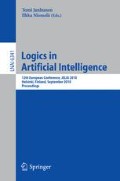Abstract
Dung’s argumentation frameworks (AFs) have become very popular as semantical tools in argumentation. We discuss a generalization of AFs called abstract dialectical frameworks (ADFs). These frameworks are more flexible in that they allow arbitrary boolean functions to be used for the specification of acceptance conditions for nodes. We present the basic underlying definitions and give an example illustrating why they are useful. More precisely, we show how they can be used to provide a semantical foundation for Gordon, Prakken and Walton’s Carneades model of argumentation, lifting the limitation of this model to acyclic argument graphs.
Access this chapter
Tax calculation will be finalised at checkout
Purchases are for personal use only
Preview
Unable to display preview. Download preview PDF.
References
Ballnat, S., Gordon, T. : Goal selection in argumentation processes. In: Proc. Computational Models of Argumentation (2010)
Brewka, G., Gordon, T.F.: Carneades and abstract dialectical frameworks: A reconstruction. In: Proc. COMMA (2010)
Brewka, G., Woltran, S.: Abstract dialectical frameworks. In: Proc. Principles of Knowledge Representation and Reasoning, pp. 102–111 (2010)
Dung, P.M.: On the acceptability of arguments and its fundamental role in nonmonotonic reasoning, logic programming and n-person games. Artif. Intell. 77(2), 321–358 (1995)
Farley, A.M., Freeman, K.: Burden of proof in legal argumentation. In: Proc. ICAIL 1995, pp. 156–164 (1995)
Gordon, T.F., Prakken, H., Walton, D.: The Carneades model of argument and burden of proof. Artif. Intell. 171(10-15), 875–896 (2007)
Gordon, T.F., Walton, D.: Proof burdens and standards. In: Rahwan, I., Simari, G. (eds.) Argumentation in Artificial Intelligence, pp. 239–258 (2009)
Grabmair, M., Gordon, T., Walton, D.: Probabilistic semantics for the Carneades argument model using Bayesian belief networks. In: Proc. Computational Models of Argumentation (2010)
Author information
Authors and Affiliations
Editor information
Editors and Affiliations
Rights and permissions
Copyright information
© 2010 Springer-Verlag Berlin Heidelberg
About this paper
Cite this paper
Brewka, G. (2010). Nonmonotonic Tools for Argumentation. In: Janhunen, T., Niemelä, I. (eds) Logics in Artificial Intelligence. JELIA 2010. Lecture Notes in Computer Science(), vol 6341. Springer, Berlin, Heidelberg. https://doi.org/10.1007/978-3-642-15675-5_1
Download citation
DOI: https://doi.org/10.1007/978-3-642-15675-5_1
Publisher Name: Springer, Berlin, Heidelberg
Print ISBN: 978-3-642-15674-8
Online ISBN: 978-3-642-15675-5
eBook Packages: Computer ScienceComputer Science (R0)

